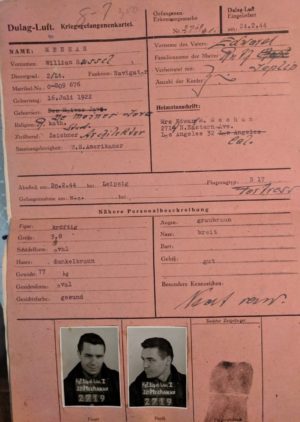The story of World War II airmen Marvin Dille and William Meehan
By Matthew Walsh
Six days after Belle Plaine’s 1st Lt. Marvin E. Dille’s tour ended on Jan. 4, 1944, Des Moines’ 2nd Lt. William R. Meehan’s began. Luckily, Meehan did not partake in the disastrous mission over Oschersleben, Germany. The Jan. 11, 1944, assault on a German aircraft production site had been cancelled, but the message had not reached all of the bomb groups. Seventy-five percent of the 700 bombers aborted while others unknowingly continued without fighter escort. The German Luftwaffe unloaded on them. “Jerry” destroyed 34 bombers and 369 men were lost; the 381st Bombardment Group suffered its worst casualties since Schweinfurt. Meehan soon joined the long list of lost airmen.

William Meehan’s 1944 POW identification card issued by his German captors during World War II.
Meehan kept a journal and vividly recounted his entry into combat on Jan. 30, 1944. At 7:40 a.m. the announcement came, “Clear right! Clear left! Start engines!” Meehan continued, describing takeoff from Ridgewell, “The still air is broken by the whine of the starters, then a muffled coughing as powerful engines come to life … Ghostly objects move on to the perimeter track, begin taking form, stately bombers trundling into position … Blue flame streams from superchargers as throttles are pushed forward. With a thundering roar the plane begins to move. Slowly, at first. Then with the ever gathering speed it hurtles down the runway. As it clears the field boundaries, the reverberating echoes of the engines rock the field.”
At 9:20 a.m., the wing assembled into one of the largest aerial armadas ever gathered with 777 heavy bombers destined for Brunswick, Germany. At the time of Meehan’s first flight, only half of all airmen had finished their first five missions and life expectancy of a bomber crew was about 15 missions. The navigator understood the odds were stacked against him. As his B-17F, nicknamed “The Joker,” joined formation, he shared his troubled mindset: “A peculiar sensation overtakes you. The feeling that this is going to be your last flight. Premonition? Perhaps. You shrug it off and adjust your oxygen mask. The next few hours are going to be quite busy — no time for worrying.”
As the Frisian Islands approached, airmen knew they had entered enemy airspace. Moments later, U.S. and German forces began another sparring match in the blue and white arena.
TO READ THE ENTIRE STORY AND OTHER FASCINATING STORIES ABOUT IOWA HISTORY, subscribe to Iowa History Journal. You can also purchase back issues at the store.
